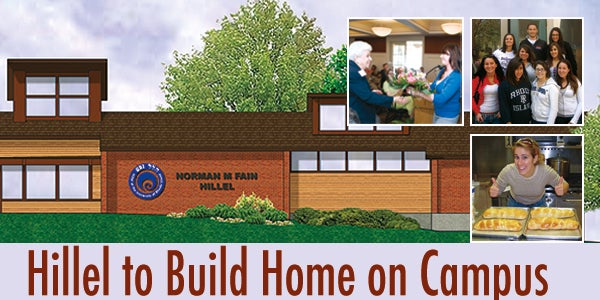Hillel to Build Home on Campus

The Norman M. Fain Hillel Center
The former Alpha Epsilon Pi fraternity house will be renovated and re-designed to create the 7,000 square-foot Norman M. Fain Hillel Center. The center will be a central meeting point where students can celebrate Jewish life, explore both Jewish and universal issues, build life-long friendships, and enrich their personal growth. In addition to lounges for programs or casual get-togethers and room for religious services, the center will provide the first and only kosher kitchen and dining space on campus where Hillel will hold its festive Shabbat and holiday dinners and more.
|
|
The words of today’s Hillel student president, Jessica Wolchok, echo those of past presidents and thousands of others who have been involved in the Jewish student organization at the University. That spirit of student leadership and involvement will become even stronger as Hillel builds its permanent new home on campus.
For the first time since it was established in 1948, URI Hillel will have a permanent doorway upon which to affix its Mezuzah (a small container holding a parchment paper with words from the Jewish Torah) and welcome new generations of students.
With the support of its students, alumni, and friends, Hillel has launched a $4 million capital campaign to design, build, and maintain a new center for Jewish life on campus. The center, located in the heart of the University’s freshman residential area, will play a key role in shaping the future of Jewish student life at the University and enrichingthe entire campus community.
At the campaign kick off last spring, Rosalie Fain and other Fain family members gathered at URI’s Alumni Center with more than 100 students, faculty, staff, alumni, Jewish community leaders, and friends to announce a $1 million gift from the Norman and Rosalie Fain Family Foundation. The gift was made in memory of Norman Fain ’36, Hon. ’67
“We see this as a fitting tribute to our father and an opportunity to invest in the future of the Jewish community,” said Jonathan Fain at the event.
“Hillel has been a part of the URI family for many years. It helps build a strong sense of community for our students and guides them toward roles as active citizens in our nation. Hillel creates leaders; young people able to lead in the global village and in the world marketplace. I am so grateful to the Fain family for their commitment to Jewish students and to all the students of URI,” said President Robert L. Carothers.
When URI Hillel was established 60 years ago, there were a handful of Jewish students on campus. Today, there are more than 1,200 Jewish undergraduate and graduate students.
Amy Olson, executive director of URI Hillel, said that although she officially began her position in 2005, her association with Hillel started in the 1970s when her sister, Paula Silverberg Goldberg ’75, was an undergraduate. At that time her mother, Helen Silverberg, M.L.S. ’68, “schlepped all the way from Cranston to Kingston to fry latkes (potato pancakes) for Hillel’s Hanukkah party and schlepped me along to help,” Olson said. “Somehow that oil, and the spice of Hillel must have seeped into my veins, destined my career, and led me back to URI.”
Her personal link to Hillel, and the generosity of the Fain family reminded Olson of words from an Israeli folk song, Ki Od Nimshechet Hasharsheret (the chain continues). “Even in my short time as director, I have seen our students, both while in school and as graduates, create new links through their involvement in community service, politics, business, and the arts,” she said.
”Hillel has become part of the community fabric of our campus, integrated with myriad functions and programs for both Jewish and non-Jewish students,” said Associate Vice President for Student Affairs Chip Yensan. “Hillel’s sponsorship of so many diverse offerings and its genuine willingness to partner with the Division of Student Affairs has become standard contributions to our campus life.”
Melvin Wade, director of the URI Multicultural Center, agreed with Yensan. “Hillel has emerged as a leading model of programmatic excellence, artfully balancing the need for supporting Jewish identity with the need for promoting a multicultural spirit,” Wade said.
Barbara Sokoloff ’64, ’71, president of URI Hillel’s Board of Directors, said that more than 35 Hillel Foundations across the country have either built new or refurbished existing facilities during the past 13 years.
“In each case, the new Hillel centers enhanced the quality of campus life and expanded student involvement,” Sokoloff said. “Based on feedback from students, faculty, staff, and parents, URI Hillel should see similar results here. With the space, there will be new opportunities for students to grow as people and as Jews.”
An active member of the Student Alumni Association, Jessica Wolchok will graduate before the new Hillel building is open. “I know it will be a great resource for students for years to come,” she said. “Whether coming together for social events, Shabbat dinners, or community service, we find enormous resources through Hillel. I can just imagine what we’ll be able to do when we have a space to call our own. Some of my best memories and closest friends have come from this organization.”
“I am thrilled with the growth of Jewish life at URI and by the vision of Hillel’s leadership and the Jewish community to make this enormous commitment to the students. We are not only building a facility, but building our future leaders,” said Olson.
For information about the Norman M. Fain Hillel Center and to learn about giving opportunities, contact either Lawrence Sadwin, URI Hillel development director, or Amy Olson at 401.874.2740 or email amyolson@mail.uri.edu.
By Jhodi Redlich ’81
 Home
Home Browse
Browse Close
Close Events
Events Maps
Maps Email
Email Brightspace
Brightspace eCampus
eCampus


